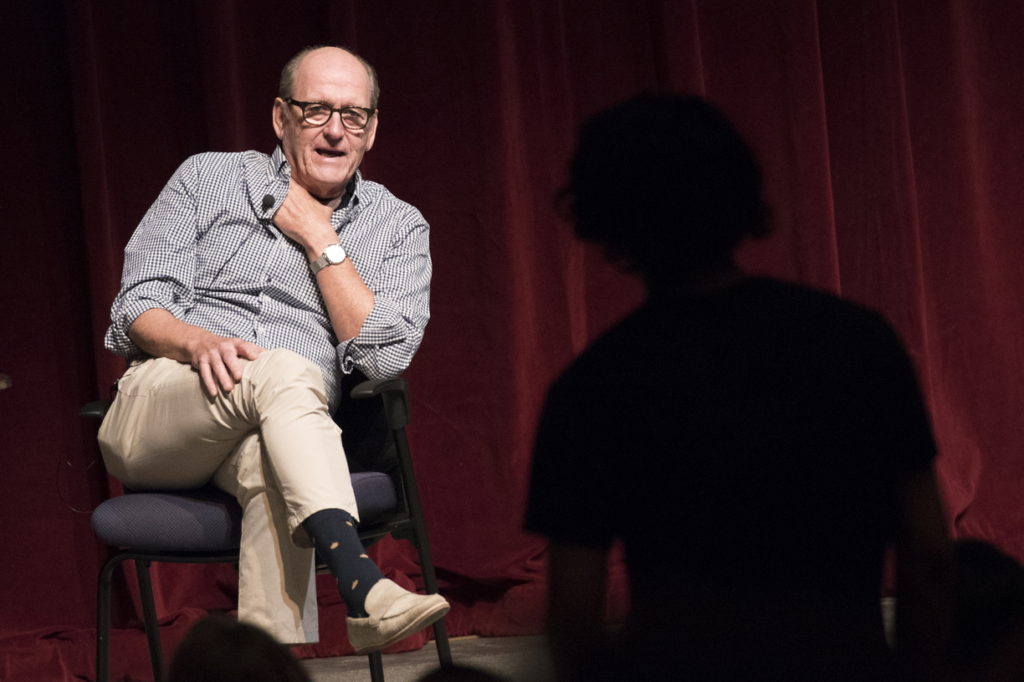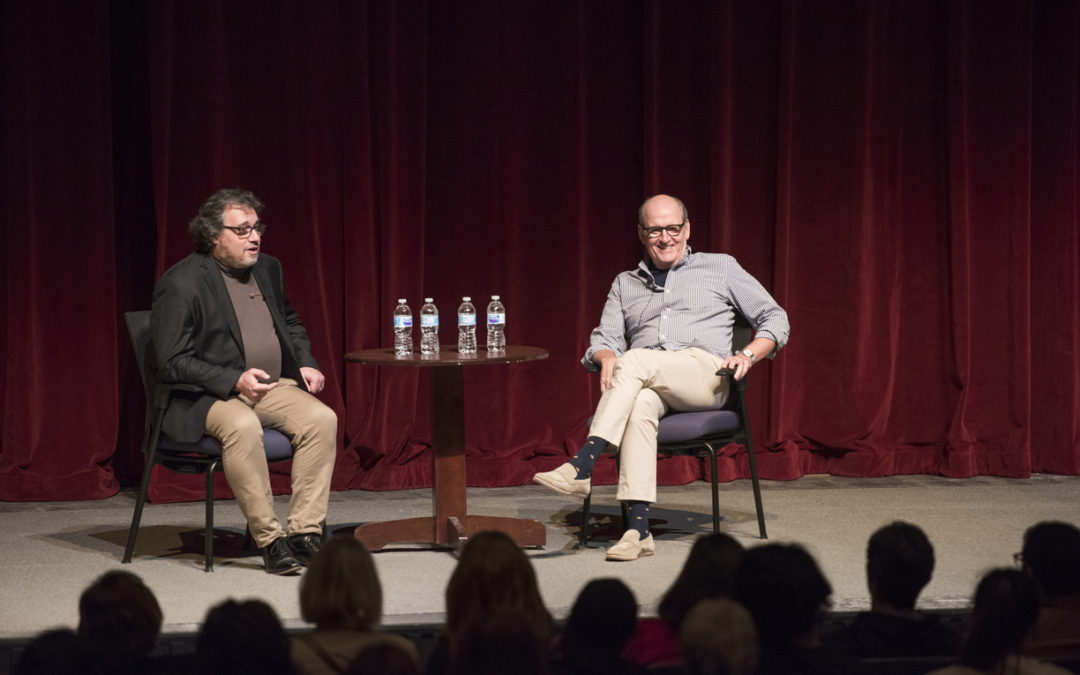“Be yourself. There’s nobody else like you. If you try to act like somebody else you can’t be yourself.”
If there was an over-arching theme in a 90 minute question and answer session between Oscar nominated actor Richard Jenkins and a crowd of more than 120 students at Northern Illinois University’s O’Connell Theatre, October 30, it was that. The best actors have learned how to maximize the only part of the process they can truly control–their own talent.
Jenkins, a DeKalb native, was in town for the final night of the Egyptian Theatre’s Richard Jenkins Film Series, and he visited the newly renovated Stevens Building at NIU for a discussion with School of Theatre and Dance students moderated by the school’s director, Alex Gelman.
Though best known for his work in films, which includes Oscar nominations for The Visitor and The Shape of Water, and for his TV work including Six Feet Under and his Emmy award winning performance in the mini-series Olive Kitteridge, the first nearly 20 years of Jenkins’ career were primarily spent on stage.
Jenkins spent 14 years performing at Trinity Repertory Company in Providence, RI, and also served as artistic director for four years ending in 1994.
When asked about the differences between film and theater, Jenkins joked, “The acting’s the same, you just have to talk a little louder on stage.”

Jenkins answering a question from an NIU School of Theatre and Dance student.
He told the students about his short-lived move to Hollywood.
“Nothing I had planned worked out,” he said. “The L.A. trip convinced me that I was helpless in so much of the business, but I could control my talent. So, I forgot about all that other stuff. I learned that it’s not about getting the job, it’s about finding out who you are as an actor and believing you are enough.
“I don’t like characters, I like human beings,” he said. “Somebody playing a character is trying to make sure the audience knows what’s happening all the time. I fight that. You need to find the person you are playing through yourself.”
Jenkins talked about how the script for The Shape of Water appealed to him from the very start, and about the experience of working with the movie’s director Guillermo del Toro.
“Guillermo wrote eight page back stories for all of the main characters, and gave them to us and said ‘take it or leave it,'” he said. “You know what he wanted. He asked me if was going to use it and I said no. In my mind, if it’s not on the page of the script it doesn’t exist. So months later, we’re at the Golden Globes and they announce my category, and they call somebody’s else’s name. Guillermo leaned over to me and said, ‘If you’d used the backstory…’ He was sitting on that joke for a year!”
Jenkins shares an agent, Rhonda Price, with actor/director Tom McCarthy, who has best original screenplay Oscars for Spotlight and Up. When McCarthy was writing the script for The Visitor, Price urged him to watch some of Jenkins’ movies. He did and when he finished the screenplay he offered Jenkins the lead role of Walter.
“I was flattered,” Jenkins said. “But I told if that if he cast me nobody was going to give him the money to make the movie. He told me he’d written Walter with me in mind and to not worry about it.
“So, we’re making the movie and he’d come by to talk to me in my tiny little trailer and on his way out he’d joke, ‘You know, if I’d cast somebody else, we’d have bigger trailers.’ What I remember most is sitting in my seat at the movie’s premiere at the Toronto Film Festival and thinking, if this movie sucks, it’s my fault.”
He was asked about what it was like to work with Will Ferrell in Jenkins’ memorable role as Dr. Doback in Step Brothers.
“When you work with Will Ferrell, you learn that his goal is for you to be funnier than him. Of course, that’s not going to happen. When I was nominated for awards (for The Shape of Water) Will sent me a gift. I get this box in the mail and I open it up and it’s a Rolex watch. He’d included a note that said congratulations and that I should wear it at all of my media appearances. My wife looked at it and said, ‘Rolexes don’t come in boxes like that.’ He’d sent me a fake! You know, I should have worn it.”
In the conclusion to the session Jenkins said, “You don’t really learn by being good. You learn by being sh**ty. But when you’re good, you want that feeling all the time.
“All I know is that I loved it, and the thought of not being able to do it was almost more than I could bear. And there were times when it looked like it wasn’t going to happen. It’s a fantastic profession, and there are a million wonderful ways to live your life in it.”

